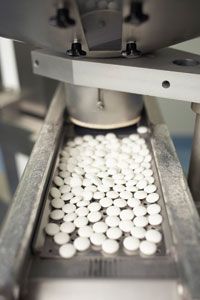Obtaining a Drug Manufacturing License: Journey to Cachet

Decisions in the contract manufacturing business are relatively simple but amazingly critical. The criticality of the decisions stems from the fact that the margins are thin and the competition is stiff. This differentiates the contract manufacturer from other segments of the industry in some very key areas. The relative margin differences and the relative competitive differences really force focus from all those who participate in the decision-making process. The margin for error in the manufacture of product for distribution by someone other than yourself means that you must perform. There is no other acceptable result. The competition will eat you alive if the product you produce is not precisely what the customer wants as far as price or quality. Thus, every decision affecting the production cost or processing of the product is critical.
Among the decisions ready to be made is the determination as to what standards for the manufacture of the products should be applied. The answer may appear obvious, especially now with the implementation of dietary supplement good manufacturing practices (GMPs), but there are alternatives. Specifically, there is the opportunity to anyone in the business of contract manufacturing to pursue obtaining a drug manufacturing license. This decision is not one that a company comes across during the normal course of doing business in this industry, but it is one that can be a positive force within contract manufacturing companies. There are negatives as well, but the overall potential for determining to pursue a drug manufacturing license far outweighs the negatives. That is, if the decision is made in context and with the anticipated benefits clearly defined and understood.
A solid way to assess these positives and negatives is to run through them from the determination perspective. The determination must focus on the intended outcomes. These outcomes can be simply summarized as follows.
OUTCOMES
Presentation. Obtaining a drug manufacturing license offers the contract manufacturer the opportunity to better present itself with distinction. This distinction puts space between you and the competition. There is, however, a distinct limit on the cachet that comes along with holding this license, and thus the image polishing that comes with the license must not be the sole motivation for the work involved in obtaining it. Those organizations seeking a contract manufacturer will seek one that can perform at the price point they desire. Advertising touting the presence of a drug manufacturing license is one small piece of the determination these customers make. While it may make a difference in a close contest, it will likely not be the determining factor.

Procedures. One of the interesting outcomes for the industry from the dietary supplement GMPs is the new mandates for documentation. This is the result of requests from the industry as much as anything else during the rulemaking process. This documentation includes heavy doses of procedural documentation. The process for obtaining a drug manufacturing license includes a strict and diligent review of these procedures. The GMPs for drugs are very reliant upon procedural documentation, and in order to obtain and maintain this license, an inspection must occur that includes a review of these procedures and how they are implemented. The inspection will verify that the procedures in place are clear and adequate. This message also can be delivered to the potential customer-that your operation has been inspected and has no issues.
Process. The efforts that go into preparing for and maintaining a drug manufacturing license cause the folks who work in the organization to look more closely at each aspect of what they are doing. In operations, this means that there is clear understanding of what the equipment can and cannot do. This greater understanding provides benefit when new business comes to the door. The greater the understanding of the processes you maintain in your operation, the better you are at evaluating the feasibility of the formulas you are asked to manufacture. Sometimes this leads to turning down business. However, understanding your processes sufficiently well to do so also means that you are less likely to take on a project that will bog down the operation and potentially result in negative business.

Pride. While this is strictly an internal benefit, it shows throughout the whole of the operation. The additional effort and the need for that effort are emphasized within the contract manufacturing company. When this effort is used effectively, the overall sense of ownership of the processes and the feeling of worth of action rises. This makes for a far more cohesive operation and one in which the individual performers are as aware as anyone of the needs and desires for positive outcomes.
The three areas cited above are the critical pieces of achievement when a contract manufacturer or any manufacturer of dietary supplements strives to obtain a drug manufacturing license. Among the tangible outputs from these benefits are the following.
Meaningful raw-material requirements. This is also emphasized in the new GMPs for dietary supplements. The requirements for a drug manufacturing license more clearly mandate better understanding of the initial components used in the making of the products. This also feeds into having strict control over the flow of the materials themselves. The licensing procedural review emphasizes this to a greater extent than with dietary supplement GMPs, and thus the benefits go beyond the norm for the primary class of goods.
Deliberate processes for the production of the products. The processes that result in the products are tighter than they would be without having put in the effort to obtain a drug manufacturing license. This includes everything from second signatures at all steps in the process to the clear and consistent documentation of the steps performed for virtually every task. This deliberation is a significant contributor to the finest-quality product that can be achieved.
Consistent product. This is the biggest payoff from the determination to obtain a drug manufacturing license. The result of all the efforts put into the understanding, documenting, and implementing of the various procedures yields remarkably consistent results. When working in the field of contract manufacturing, the ability to provide consistent product in an efficient manner across a broad range of product formulations is the key to success. That is assisted by the efforts necessary to obtain a drug manufacturing license.
PITFALLS
Making the Leap to Contract Manufacturing
By Shaheen Majeed
In the early 1990s, Sabinsa Corp. pioneered many of the herbal ingredients you read about and consume today. We developed standardized extracts, and from there, we branded and patented many ingredients to leverage their useful benefits. As time went on, we realized our formulations expertise was becoming a critical part of many companies' supply-chain management. We often would pilot a tablet or capsule formula with and without proprietary Sabinsa ingredients for our customers. Eighteen months ago, we decided to give our customers the complete vantage point, from field to bottle.
STRATEGIC OUTLOOK
It's difficult to quantify the extensive expectations customers and marketing companies have for contract manufacturers. They are looking for a true partner, someone with the ability to create custom formulas, provide research and development, source ingredients, suggest dosages, manufacture, and package, to mention a few. At Sabinsa, we already had a long history of partnering with customers to provide services ranging from supplying exclusive ingredients to claim substantiation and comarketing. We even used our intellectual property expertise to help several companies patent their own proprietary formulas. Recently, Sabinsa began offering the services of clinical trials to customers on their finished formulas for further claim substantiation. So in essence, by expanding our contract manufacturing services, we were able to take our partnership with our customers to another level.
In the early days, Sabinsa offered a small range of contract services; today, we offer at a grand and more flexible scale. Our new plant can manufacture and package 160 tons of granules, 45 million tablets, and 40 million capsules per month, all on a two-shift basis. Sabinsa's facility also features new process technology and automation optimized for the demanding standards of our nutraceutical customers. For example, a scale-up from 60 kilos to two independent 500-kilo tanks on the granulation side has taken place. In terms of blending, our capacity has increased from 45 kilos to 2 tons in the new phase. We are also able to provide roll compaction and comill particle-size reduction for companies that want to condition certain ingredients for effective tableting, capsule filling, or subsequent processing. We also saw a need for coating tablets, which provides a range of benefits to our customers.
Observing a trend in stick packages, we carefully studied the market and the related food industry and saw potential here in our own nutraceutical industry. The contents of these stick packs can hold several grams of product for disbursement in water or the beverage of your choice. Interestingly, Sabinsa has been selling and marketing powdered premixes for beverages for the last couple of years. Now with our two recent generally recognized as safe (GRAS) ingredients, Citrin K and Selenium SeLECT, the transition from nutraceutical to food industry becomes effortless for our customers.
The driving force behind our decision to expand our contract manufacturing services in the United States stemmed from services already being provided to our international customers. Sabinsa currently has offices in Australia, China, Europe, Japan, Malaysia, and South Africa. For nearly two years in India, our formulation and production teams have worked to develop exclusive formulas. Once these formulas were approved, customers would buy the tablets and/or capsules in bulk from our Indian manufacturing setup and package them locally in their respective countries. With Sabinsa's expanded facility in Payson, UT, it is now possible to produce these bulk tablets or capsules and package them in the United States at very reasonable costs-much less than what most people would think for a "Made in USA" label and still be profitable.
FACILITY AND PERSONNEL
For these reasonable costs to exist, Utah was the perfect location for our 42,000-sq-ft contract manufacturing facility. Utah has been viewed as the herbal hub, and this is validated by the many companies that exist throughout the state. The labor force is good, land is plentiful for expansion purposes, and it made sense to add onto our already existing facility. With our resources in India, we were able to obtain high-quality stainless-steel equipment for a fraction of the cost that most contract manufacturers would have to pay to buy locally-another cost-saving effort passed on to our customers.
Even before the plant was operational, we brought on board an experienced plant manager. Then, we quickly focused on hiring knowledgeable and capable people for plant production. Technicians from India and other parts of the world were flown in, consultants from the industry were asked to join our panel, and Utah's base of capable, hard-working people was employed. We also have someone constantly watching the regulatory process and keeping us informed of any changes or additions that need to be met. It is critical to continue to monitor good manufacturing practices (GMPs) standards and take no shortcuts in implementing these standards. In order to ensure these standards were being met, we hired on a QC manager to handle all aspects of the manufacturing.
The new expanded manufacturing facility also houses a series of testing labs, testing equipment, pilot laboratories for formulation development, and equipment for modified-release technology in a controlled environment that meets all CGMP requirements to ensure optimum quality control of the manufactured products. The plant will produce nutraceutical solid-dosage forms to cater to the United States, Europe, Japan, and Middle Eastern markets. With the current setup, Sabinsa has moved up the value chain from an ingredient supplier to a full-fledged manufacturer of the nutraceutical solid-dosage forms. Because several of our customers are producing finished goods for the world market, we also plan to take this facility through the Therapeutic Goods Administration (TGA) certification process within the year.
We also looked at our existing expertise in providing high-grade curcumin ingredients and decided a dedicated curcumin facility for capsules would be a strong value-add for our customers. Because of the strong color, handling curcumin is difficult, so to manage this we implemented a specialized cleanup process to ensure the shortest downtime in the industry for handling such a product.
EXPANDING CAPABILITIES
The greatest advantage Sabinsa still offers customers is sourcing herbal raw materials. Most contract manufacturers source from a vast number of companies; Sabinsa often has these ingredients in-house. This gives cost-saving benefits that are passed on to the customer in terms of lower raw-material prices. With Sabinsa's quality assurance starting from the field, customers can be assured of a complete and smooth transition when it comes to their final product.

Now customers not only have access to scientifically backed raw materials, but also to value-added manufacturing capabilities that meet all of their formulation needs. This provides marketing companies and finished-goods manufacturers with added convenience, substantial cost savings, and a decreased time to market for products.
Shaheen Majeed is director of marketing at Sabinsa Corp. (Piscataway, NJ). For more information about Sabinsa, visit www.sabinsa.com or call 732/777-1111.
This report is not complete without mentioning the pitfalls along with the potential to be realized in obtaining a drug manufacturing license. These deserve notation as well when considering the benefits from the efforts. Linking these pitfalls to the benefits, we have:
Procedures leading to gridlock. It is far too easy to allow the procedural improvements that come along with the efforts to obtain a drug manufacturing license to become lock step rigidity. The materials used with great frequency in the manufacture of dietary supplements do not always fit into neat little boxes in the procedural application. This distinction can run at cross-purposes with the procedures you have in place. It is important to recognize this and structure your procedures accordingly.
Process evaluation leading to paralysis. Once more, the variability and sometimes the lack of understanding of the nature of some of the materials used in dietary supplements can result in processes needing to be carefully monitored but not to the point of stagnation. Understanding the process can also include the knowledge that some of the things encountered are not going to allow the standard process to work. This is a different world than that of drugs, and stagnation is something that no manufacturer can afford.
Pride evolving into hubris. The justifiable pride that comes with a job well done is expected. However, there can be a tendency to allow this pride to evolve too far. When this occurs, the attitude of an entire organization can be affected. Taking on too much self-importance as a result of your achievements (such as achieving a drug manufacturing license) can result in a less ambitious position. As noted before, particularly in the realm of contract manufacturing, that is not a positive outcome.
There is no need for every manufacturer of dietary supplements to obtain a drug manufacturing license. Reasons not to obtain such a license include the increased scrutiny your organization is subjected to from the regulatory agencies at both the federal and state levels. Most importantly perhaps is the fact that once you obtain a drug manufacturing license, you are expected by the entity issuing the license (an agency within your state) to manufacture drugs. Thus you either need to expand your product line to include drugs or you must find someone who needs them manufactured. It is wholly inappropriate and against the desires of the state agency to hold a drug manufacturing license just for the cachet it brings.
To summarize, the effort necessary to obtain a drug manufacturing license is actually more important and yields more results than having the license itself. The procedures, processes, and documentation necessary to obtain a drug manufacturing license pay dividends well past the issuance date of the license. The bonus is that the addition of a drug manufacturing license to your corporate advertising signature block carries a bit of cachet conveying to your prospective clients how strenuously serious your company is regarding the quality of the goods produced. While this effort is not for every company, there are benefits and improvements to be achieved directly as a result of the effort.
Kenn Isarel is vice president of marketing at Robinson Pharma Inc. (Santa Ana, CA), a drug-licensed, full-service custom contract manufacturer. For more information about Robinson Pharma Inc., visit www.robinsonpharma.com or call 714/241-0235.
Magnesium L-threonate, Magtein, earns novel food authorization in the European Union
December 19th 2024According to the announcement, the authorization is also exclusive to AIDP and its partner company and licensee, ThreoTech, meaning that they are the only parties that can market magnesium L-threonate in the EU for a period of five years.
Senate Committee has released the text of 2024 Farm Bill, with changes to hemp regulations
November 19th 2024The U.S. Senate Committee on Agriculture, Nutrition, & Forestry has introduced the Rural Prosperity and Food Security Act, which will serve as the Senate’s draft for the 2024 Farm Bill.